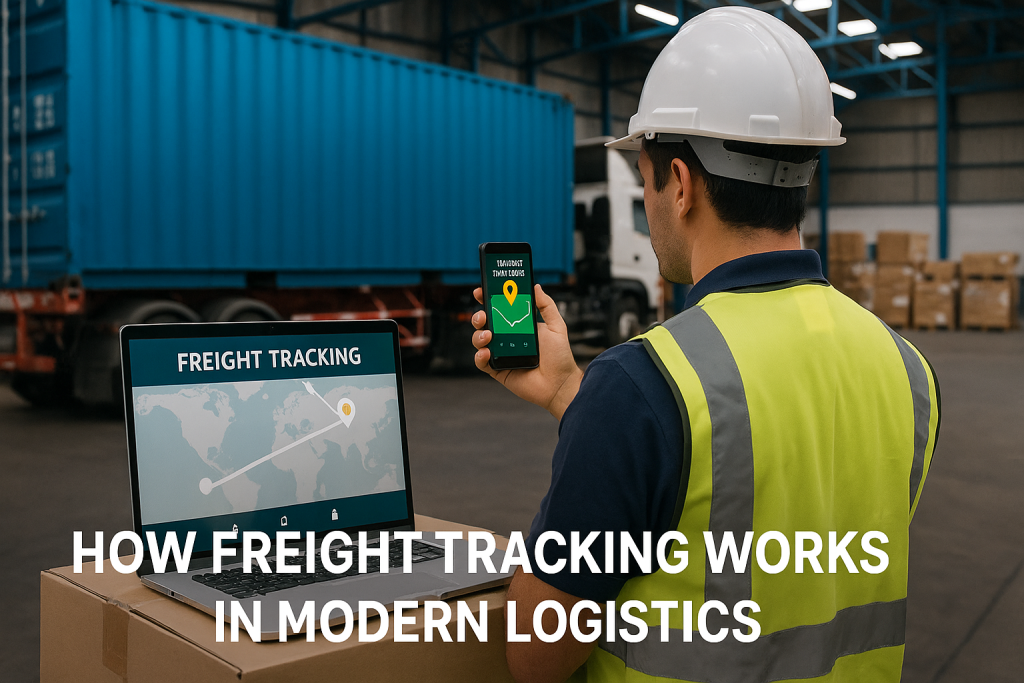By Martin Vassilev / 11 Jul, 2025
Freight tracking has moved far beyond the basic barcode scans and manual paperwork of the past. In 2025, modern logistics relies on a dynamic ecosystem of technologies that ensure visibility, accuracy, and efficiency across the entire supply chain. From real-time GPS updates to automated alerts, freight tracking plays a vital role in meeting delivery expectations and streamlining global logistics operations.

Freight tracking is the process of monitoring the movement of goods throughout the shipping cycle—from the warehouse to the end customer. This involves:
Real-time location updates via GPS
Integration with TMS (Transportation Management Systems)
Barcode and RFID scanning
Cloud-based inventory management systems
Predictive ETAs and notifications
Order Placement: Once a shipment is scheduled, data is entered into a logistics platform, initiating the tracking process.
Scanning at Origin: Packages are scanned with RFID/barcodes before departure.
In-Transit Tracking: GPS and telematics provide real-time data.
Status Updates: Stakeholders get alerts on delays, arrival times, and checkpoints.
Delivery Confirmation: Digital proof of delivery (POD) finalizes the cycle.
Integrated freight tracking systems connect warehouse, transport, and customer service data. Explore more on real-time warehouse tracking systems and their benefits to modern logistics.
GPS sensors installed in trucks and containers enable 24/7 location monitoring. Modern telematics go beyond tracking—they monitor temperature, vibration, and driver behavior.
While barcodes are still widely used, RFID tags are growing in popularity due to their ability to automatically update systems without line-of-sight scanning.
Cloud systems provide real-time collaboration between carriers, shippers, and customers. Platforms such as TMS and WMS integrate with APIs for seamless freight visibility.
See how smart distribution management further enhances operational precision using these technologies.
Real-time data enables companies to proactively manage delays, reroute shipments, and avoid customer dissatisfaction.
External Insight: Wikipedia’s article on Supply Chain Management elaborates on the importance of visibility in modern supply chains.
Customers now expect to know exactly where their orders are. Freight tracking ensures accurate ETAs, proactive communication, and increased trust.
By knowing exactly where a shipment is, logistics managers can reduce idle time, better allocate resources, and streamline processes.
Read more on how technology is revolutionizing delivery, helping businesses meet modern customer expectations.
These systems integrate with GPS, warehouse software, and customer portals to ensure smooth freight operations.
APIs allow your freight system to communicate with e-commerce platforms, warehouse systems, and third-party logistics providers (3PLs) for real-time updates.
Smart sensors track temperature, shock, tilt, and even light exposure—critical for fragile or perishable cargo.
Learn how AI integration in warehouse management supports smarter, data-driven decision-making.
Freight tracking isn’t just about knowing where your goods are—it’s about predicting where they should be. Algorithms analyze past performance, weather data, and traffic patterns to forecast delays and improve route planning.
Discover how leveraging data analytics can streamline both inventory and delivery efficiency.
With so many tracking sources, it’s easy to be overwhelmed. Companies need streamlined dashboards and intelligent filters.
Rural areas, tunnels, and international borders may experience signal drops, affecting real-time updates.
More connected systems also mean increased vulnerability. Encryption, two-factor authentication, and regular audits are crucial.
For a deeper look at technology trends transforming the logistics space, review AI’s impact on logistics.
Modern consumers demand fast, transparent shipping. For e-commerce businesses, real-time tracking is no longer optional—it’s a competitive advantage.
Freight tracking is an essential piece of the puzzle for businesses offering same-day or next-day delivery. Visit the ultimate guide to fast fulfillment for practical strategies that complement robust tracking systems.
Knowing the status of every shipment reduces redundancies, missed deliveries, and warehousing delays—translating directly into cost savings.
Blockchain offers decentralized, tamper-proof ledgers for shipment data, reducing disputes and increasing trust between stakeholders.
External Resource: The U.S. Department of Transportation has initiated several pilot programs incorporating blockchain into freight operations.
Explore more on the impact of blockchain on logistics to understand how transparency is being redefined.
International freight tracking must navigate multiple customs regulations and standards. Integrated systems that include custom clearance tools and compliance management help businesses avoid delays and fines.
External Reference: Learn more about global logistics standards from World Customs Organization
For companies expanding globally, visit Optimizing Supply Chains for Global Challenges for actionable strategies.
Machine learning is helping companies choose the most efficient shipping routes in real time.
Emerging delivery systems like drones and autonomous trucks will rely heavily on integrated tracking systems.
Logistics providers are now working toward total ecosystem visibility—from sourcing to last-mile delivery—powered by predictive AI.
Stay ahead by understanding the future of warehouse automation, which directly links to future tracking technologies.
Freight tracking is no longer a luxury—it’s a necessity for competitive logistics. Businesses that embrace real-time visibility, AI integration, blockchain, and IoT will not only reduce costs but also enhance customer satisfaction, reduce errors, and scale faster. It’s a cornerstone of efficient supply chains in 2025 and beyond.
Whether you’re a manufacturer, e-commerce brand, or 3PL provider, ensuring your freight tracking systems are modern, secure, and integrated is vital to staying competitive in today’s fast-paced logistics world.
For tailored solutions or to explore how modern logistics can elevate your operations, get in touch with ByExpress today.

“Thanks to Byexpress all my shipping and fulfillment costs are in line now”

“All my issues were solved by Byexpress team that I had with pervious 3pl provider.”

“Thank you Byexpress team could not done it without you guys.”

“Their integration and customer service were the key for me”

“Outstanding delivery service! The package was well-packaged, and
the delivery team was professional and courteous”

“Great and knowledgeable team to work with.”

Thanks, guys, for reducing my shipping rates
Ottawa Office
2411 Holly Lane
Ottawa, ON, K1V 7P2
Toronto Office
13-280 West Beaver Creek Road Unit #136
Richmond Hill, ON, L4B 3Z1
Alexandria Office
173 Kenyon Street West
Alexandria, ON, K0C 1A0
Montreal Office
4388 Saint-Denis Street Unit #200
Montreal, QC, H2J 2L1
California Office
155 North Riverview Drive
Anaheim Hills, CA, 92808
Call Us
Toll-Free: 1-866-744-7122
Local : 613-739-3000
Email Us
Multilingual Services










